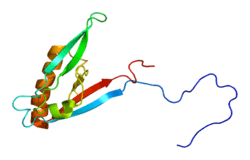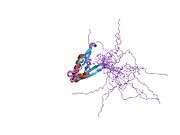PARD3B
| PARD3B | ||||||
|---|---|---|---|---|---|---|
 |
||||||
| Identifiers | ||||||
| Aliases | PARD3B, ALS2CR19, PAR3B, PAR3L, PAR3LC, PAR3beta, Par3Lb, par-3 family cell polarity regulator beta | |||||
| External IDs | MGI: 1919301 HomoloGene: 35389 GeneCards: PARD3B | |||||
| Genetically Related Diseases | ||||||
| autism, acquired immunodeficiency syndrome, osteoarthritis/osteodystrophy[1] | ||||||
| Orthologs | ||||||
| Species | Human | Mouse | ||||
| Entrez | ||||||
| Ensembl | ||||||
| UniProt | ||||||
| RefSeq (mRNA) | ||||||
| RefSeq (protein) | ||||||
| Location (UCSC) | Chr 2: 204.55 – 205.62 Mb | Chr 1: 61.64 – 62.64 Mb | ||||
| PubMed search | [2] | [3] | ||||
| Wikidata | ||||||
| View/Edit Human | View/Edit Mouse |
Partitioning defective 3 homolog B is a protein that in humans is encoded by the PARD3B gene.[4][5][6]
Interactions
PARD3B has been shown to interact with Mothers against decapentaplegic homolog 3.[7]
References
- ↑ "Diseases that are genetically associated with PARD3B view/edit references on wikidata".
- ↑ "Human PubMed Reference:".
- ↑ "Mouse PubMed Reference:".
- ↑ Hadano S, Hand CK, Osuga H, Yanagisawa Y, Otomo A, Devon RS, Miyamoto N, Showguchi-Miyata J, Okada Y, Singaraja R, Figlewicz DA, Kwiatkowski T, Hosler BA, Sagie T, Skaug J, Nasir J, Brown RH Jr, Scherer SW, Rouleau GA, Hayden MR, Ikeda JE (Oct 2001). "A gene encoding a putative GTPase regulator is mutated in familial amyotrophic lateral sclerosis 2". Nat Genet. 29 (2): 166–73. doi:10.1038/ng1001-166. PMID 11586298.
- ↑ Kohjima M, Noda Y, Takeya R, Saito N, Takeuchi K, Sumimoto H (Dec 2002). "PAR3beta, a novel homologue of the cell polarity protein PAR3, localizes to tight junctions". Biochem Biophys Res Commun. 299 (4): 641–6. doi:10.1016/S0006-291X(02)02698-0. PMID 12459187.
- ↑ "Entrez Gene: PARD3B par-3 partitioning defective 3 homolog B (C. elegans)".
- ↑ Warner, Dennis R; Pisano M Michele; Roberts Emily A; Greene Robert M (Mar 2003). "Identification of three novel Smad binding proteins involved in cell polarity". FEBS Lett. Netherlands. 539 (1–3): 167–73. doi:10.1016/S0014-5793(03)00155-8. ISSN 0014-5793. PMID 12650946.
Further reading
- Izaki T, Kamakura S, Kohjima M, Sumimoto H (2006). "Two forms of human Inscuteable-related protein that links Par3 to the Pins homologues LGN and AGS3". Biochem. Biophys. Res. Commun. 341 (4): 1001–6. doi:10.1016/j.bbrc.2006.01.050. PMID 16458856.
- Benzinger A, Muster N, Koch HB, et al. (2005). "Targeted proteomic analysis of 14-3-3 sigma, a p53 effector commonly silenced in cancer". Mol. Cell Proteomics. 4 (6): 785–95. doi:10.1074/mcp.M500021-MCP200. PMID 15778465.
- Izaki T, Kamakura S, Kohjima M, Sumimoto H (2005). "Phosphorylation-dependent binding of 14-3-3 to Par3beta, a human Par3-related cell polarity protein". Biochem. Biophys. Res. Commun. 329 (1): 211–8. doi:10.1016/j.bbrc.2005.01.115. PMID 15721295.
- Jin J, Smith FD, Stark C, et al. (2004). "Proteomic, functional, and domain-based analysis of in vivo 14-3-3 binding proteins involved in cytoskeletal regulation and cellular organization". Curr. Biol. 14 (16): 1436–50. doi:10.1016/j.cub.2004.07.051. PMID 15324660.
- Ota T, Suzuki Y, Nishikawa T, et al. (2004). "Complete sequencing and characterization of 21,243 full-length human cDNAs". Nat. Genet. 36 (1): 40–5. doi:10.1038/ng1285. PMID 14702039.
- Warner DR, Pisano MM, Roberts EA, Greene RM (2003). "Identification of three novel Smad binding proteins involved in cell polarity". FEBS Lett. 539 (1–3): 167–73. doi:10.1016/S0014-5793(03)00155-8. PMID 12650946.
- Strausberg RL, Feingold EA, Grouse LH, et al. (2003). "Generation and initial analysis of more than 15,000 full-length human and mouse cDNA sequences". Proc. Natl. Acad. Sci. U.S.A. 99 (26): 16899–903. doi:10.1073/pnas.242603899. PMC 139241
 . PMID 12477932.
. PMID 12477932. - Gao L, Macara IG, Joberty G (2003). "Multiple splice variants of Par3 and of a novel related gene, Par3L, produce proteins with different binding properties". Gene. 294 (1–2): 99–107. doi:10.1016/S0378-1119(02)00681-9. PMID 12234671.
This article is issued from Wikipedia - version of the 6/4/2016. The text is available under the Creative Commons Attribution/Share Alike but additional terms may apply for the media files.
